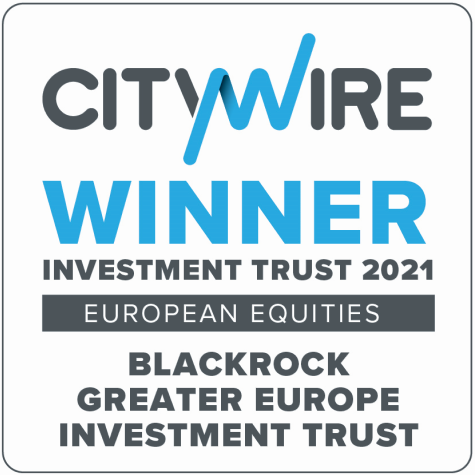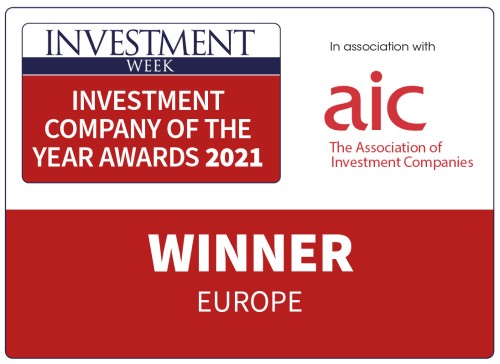About this investment trust
Capital at risk. The value of investments and the income from them can fall as well as rise and are not guaranteed. Investors may not get back the amount originally invested.
The Company aims to provide capital growth, primarily through investment in a focused portfolio constructed from a combination of the securities of large, mid and small capitalisation European companies, together with some investment in the developing markets of Europe.
Why choose it?
Europe is a rich source of innovation and dynamic capitalism. Active management can uncover its most exciting companies. The Trust invests in global brand leaders, plus smaller companies focused on niche, high growth areas. The Trust looks for high quality, well-capitalised companies with strong management teams that can create real value for shareholders over time.
Suited to…
This Trust is designed for investors looking to invest in a selection of Europe’s highest quality, fastest-growing companies, irrespective of their size and geography. They must be willing to take on some additional risk to grow their capital over the long term.
BlackRock Greater Europe Investment Trust FAQs
-
The BlackRock Greater Europe Investment Trust aims to achieve capital growth by investing in a focused portfolio of securities from large, mid and small capitalisation European companies, along with some investment in the developing markets of Europe. The experienced management team focuses on identifying high-quality firms with the potential for long-term value creation. The Trust is suited for investors seeking exposure to Europe’s dynamic and innovative companies, emphasising both global brand leaders and smaller companies in niche, high-growth areas.
-
Stefan Gries and Alexandra Dangoor are co-managers of BlackRock Greater Europe Investment Trust.
Stefan is Head of the European Equity team in BlackRock’s Portfolio Management Group, with extensive experience managing various European portfolios. Stefan is also co-manager on the European Absolute return (long/short) portfolios, as well as on Pan-European and Europe ex-UK long-only portfolios.
Alexandra joined the BlackRock Fundamentals European Equity Team in 2019. She also holds research responsibilities within the team’s financials research pod, focused on European banks and insurers.
-
Dividends from the BlackRock Greater Europe Investment Trust are declared and paid out semi-annually. Interim dividend payments are made in May with final dividend payments being made in December.
-
We believe there are reasons to be positive about European equities. Firstly, there’s valuation. We consider European stocks currently offer attractive value for investors looking to take advantage of the 2022 market fluctuations and tap into enduring trends, particularly the move towards a net-zero future.
Additionally, investing in European equities offers the benefit of targeting resilient companies poised to navigate inflation and economic slowdowns successfully. Emphasising dividends, with over 70% of European companies planning to reinstate or increase them, provides a key source of return. We seek mature, cash-generating companies with proven business models and strong financials across sectors, which present an attractive investment opportunity.
Europe hosts numerous top-tier companies, strategically positioned to support global governments in achieving their net-zero omissions objectives. Themes like infrastructure, automation, and the shift to electric vehicles are well represented in the BlackRock Greater Europe portfolio, making European equities an attractive prospect for long-term returns amid evolving market conditions.
-
The BlackRock Greater Europe Investment Trust provides an all-around solution for investing in large, mid and small-cap European businesses. The Trust taps into Europe’s innovation and dynamic capitalism, actively seeking out its most promising companies. With a portfolio including global brand leaders and smaller firms focusing on niche, high-growth areas, the Trust encompasses high-quality and well-capitalised companies with strong management, aiming to create lasting shareholder value. The BlackRock Greater Europe Investment Trust is suited to investors seeking exposure to Europe’s top-quality, fast-growing companies, regardless of size or location, and to those willing to take on additional risk for long-term capital growth.



Citywire: As at 16 November 2021.
Investment Week: As at 18 November 2021.
Kepler Rating: As at 1 January 2022.
What are the risks?
- Capital at risk. The value of investments and the income from them can fall as well as rise and are not guaranteed. Investors may not get back the amount originally invested.
- Overseas investment will be affected by movements in currency exchange rates.
- Emerging market investments are usually associated with higher investment risk than developed market investments. Therefore the value of these investments may be unpredictable and subject to greater variation.
- Investment strategies, such as borrowing, used by the Trust can result in even larger losses suffered when the value of the underlying investments fall.
- The Trust’s investments may have low liquidity which often causes the value of these investments to be less predictable. In extreme cases, the Trust may not be able to realise the investment at the latest market price or at a price considered fair.
Useful information
Capital at risk. The value of investments and the income from them can fall as well as rise and are not guaranteed. Investors may not get back the amount originally invested.
Fees & Charges
Annual Expenses as at Date: 31/08/2023
Ongoing Charge: 0.98%
Management Fee Summary: BlackRock receives an annual management fee of 0.85% per annum of the Company’s net asset value on assets up to £350 million and 0.75% per annum of net asset value on assets thereafter.
-
ISIN: GB00B01RDH75
Sedol: B01RDH7
Bloomberg: BRGE LN
Reuters: BRGE.L
LSE code: BRGE
-
Name of Company: BlackRock Fund Managers Limited
Telephone: 020 7743 3000
Email: cosec@blackrock.com
Website: www.blackrock.com/uk
Correspondence Address: Investor Services,
BlackRock Investment Management (UK) Limited,
12 Throgmorton Avenue,
London
EC2N 2DL
Name of Registrar: Computershare PLC
Registered Office: 12 Throgmorton Avenue,
London
EC2N 2DL
Registrar Telephone: +44 (0)370 707 1163
Place of Registration: England
Registered Number: 5142459
-
Year End: 31 August
Results Announced: April (half yearly), October (final)
AGM: November/December
Dividends Paid: May (interim), December (annual)
Latest company announcements
Capital at risk. The value of investments and the income from them can fall as well as rise and are not guaranteed. Investors may not get back the amount originally invested.
Filter by type:
Filter by date period:
Sign up for Regulatory News Service alerts
To receive email alert notifications once an update to the Trust occurs, please sign up and select the updates you would like to receive via The Association of Investment Companies website here. Please be aware by clicking on this link you are leaving BlackRock and entering a third party’s website. As such, BlackRock is not liable for its content.
ESG Integration
Environmental, Social and Governance (ESG) investing is often conflated or used interchangeably with the term “sustainable investing”. BlackRock has identified sustainable investing as being the overall framework and ESG as a data toolkit for identifying and informing our solutions. BlackRock has defined ESG Integration as the practice of incorporating material ESG information and consideration of sustainability risks into investment decisions in order to enhance risk-adjusted returns. BlackRock recognises the relevance of material ESG information across all asset classes and styles of portfolio management. The Investment Manager may incorporate sustainability considerations in its investment processes across all investment platforms. ESG information and sustainability risks are included as a consideration in investment research, portfolio construction, portfolio review, and investment stewardship processes.
The Investment Manager considers ESG insights and data, including sustainability risks, within the total set of information in its research process and makes a determination as to the materiality of such information in its investment process. ESG insights are not the sole consideration when making investment decisions and the extent to which ESG insights are considered during investment decision making will also be determined by the ESG characteristics or objectives of the Company. The Investment Manager’s evaluation of ESG data may be subjective and could change over time in light of emerging sustainability risks or changing market conditions. This approach is consistent with the Investment Manager’s regulatory duty to manage the Company in accordance with their investment objectives and policies and in the best interests of the Company’s investors. The Investment Manager’s Risk and Quantitative Analysis group will review portfolios to ensure that sustainability risks are considered regularly alongside traditional financial risks, that investment decisions are taken in light of relevant sustainability risks and that decisions exposing portfolios to sustainability risks are deliberate, and the risks diversified and scaled according to the investment objectives of the Company.
BlackRock’s approach to ESG integration is to broaden the total amount of information the Investment Manager considers with the aim of improving investment analysis and understanding the likely impact of sustainability risks on the Company’s investments. The Investment Manager assesses a variety of economic and financial indicators, which may include ESG data and insights, to make investment decisions appropriate for the Company objectives. This can include relevant third-party insights or data, internal research or engagement commentary and input from BlackRock Investment Stewardship.
Sustainability risks are identified at various steps of the investment process, where relevant, from research, allocation, selection, portfolio construction decisions, or management engagement, and are considered relative to the Company’s risk and return objectives. Assessment of these risks is done relative to their materiality (i.e. likeliness of impacting returns of the investment) and in tandem with other risk assessments (e.g. liquidity, valuation, etc.).
ESG integration does not change the Company’s investment objective or constrain the Investment Manager’s investable universe, and does not mean that an ESG or impact focused investment strategy or exclusionary screens have been or will be adopted by the Company. Similarly, ESG integration does not determine the extent to which the Company may be impacted by sustainability risks.
Fund manager commentary
31 August 2024
Comments from the portfolio managers
Please note that the commentary below includes historic information in respect of performance data in respect of portfolio investments, index performance data and the Company’s NAV performance.
The figures shown relate to past performance. Past performance is not a reliable indicator of current or future results.
During the month, the Company’s Net Asset Value (NAV) rose by 2.0% and the share price declined by 1.6%. For reference, the FTSE World Europe ex UK Index had returned by 1.5% during the period.
August was marked by significant market volatility, primarily triggered by a weak US jobs report that raised concerns about a potential downturn in the US economy. This was compounded by the unwinding of the yen carry trade, leading to a substantial decline in Japanese markets, spreading concerns globally. However, the situation quickly stabilised as better economic data and a dovish message from Fed Chair Powell at Jackson Hole reassured investors.
During the month, we saw a continued rotation out of cyclical stocks into defensive ones which we had started to witness in the prior month, as investors expressed a preference for safer assets amidst the uncertainty. Real estate, communication services, healthcare and utilities were the strongest performers while technology shares fell the most.
Despite the turbulence, European markets managed to hold up well. The Company outperformed its reference benchmark, largely driven by strong stock selection. In sector terms, the portfolio’s zero exposure to energy aided returns, as did a higher allocation to consumer discretionary. The higher allocation to cyclical sectors such as IT hurt relative performance. An overweight to industrials was also negative although offset by accurate stock selection. Lower weights in defensive sectors including telecoms and consumer staples were negative during August. Ferrari was the top performer during the month thanks to very strong Q2 earnings with revenues 7% and EBIT 9% ahead of expectations, driven by both product mix and higher than expected personalisation revenues. The average selling price increased by 14% to EUR 423k and the order book remains full providing earnings visibility through 2026.
IMCD, a global distributor of specialty chemicals and ingredients, started to recover from its previous underperformance after delivering better-than-expected results. The company achieved a slight beat on gross profit and EBITA, as it enters a period of normalised comparables, driven by M&A and a gradual recovery in the Americas business.
Adyen shares also gained after an H1 2024 report with results in line with consensus estimates across metrics. Revenue growth of 23.6% came in above consensus expectations which were looking for 21-23% organic sales growth, which helped to alleviate much of the bear case concerns. Management also spoke to the positive impact from hires made in 2023 and a longer client pipeline adding to visibility.
Similar to what we observed in July, the technology sector was the largest detractor in August, with ASML and ASMi among the most affected. Despite semiconductor companies delivering robust Q2 earnings, shares were impacted by concerns over the return on AI investments, potentially peaking hyperscaler capex, and possible restrictions on selling to China. Intel's (not held) warning about cutting capex spend caught the markets attention but will have limited impact on 2024 earnings for the semiconductor companies we own. While there is still no clarity on the return on AI investments, the race to build the best AI infrastructure is still in its early stages, and there remains a strong push to stay at the forefront. Elsewhere in the sector, a holding in STMicro dragged on relative returns following cuts during their Q2 update in July, bringing down full year sales guidance as well as 2024 and 2025 EPS. With our thesis of an improved business with greater margin resiliency through cycle challenged by the update, we are reassessing the position.
Within healthcare, owning Lonza detracted with shares down marginally in August after a >20% gain the previous month on the back of positive first half results. We remain pleased seeing the acceleration in sales momentum and profitability beat come through following the earlier qualitative update, leading to increased confidence in managements’ execution and communication.
Finally, RELX experienced some weakness in August after having shown strong performance earlier in the year. Although there was no specific stock-related news, it is likely that the shares were volatile as RELX is considered an AI winner, and profit taking in this segment was broad based during the course of the month.
Outlook
As economic momentum gathers pace and company guidance strikes a more optimistic tone, Europe has come into the spotlight. The European Central Bank’s decision to cut rates was taken positively, although the jury remains out on the speed rates fall from here. Whilst this rate change is positive for asset class sentiment, operationally we see limited impact on companies.
Rising political discontent, however, has been a thorn in the region’s side. Geopolitical tensions around tariffs and elections as well as weaker macro data in the US and China have added a degree of uncertainty. We take confidence in the changed regulatory landscape for banks in helping manage perceived contagion risk that could arise from potentially weaker fiscal positions; and believe the negative impact of tariffs would only be meaningful for a small group of companies. Whilst uncertainty on policy outcomes remains, we believe the growth impact is likely limited in the near-term and economies should continue their positive inflection.
Long-term structural trends and large amounts of fiscal spending via the Recovery fund, Green Deal and the REPowerEU plan in Europe can also drive demand for years to come, for example in areas such as infrastructure, automation, innovation in medicines, the shift to electric vehicles, digitization or decarbonisation. European Equities remain attractively valued versus history and especially so in comparison to the US. Overall, evidence of a resilient consumer, a healthy corporate sector and unchanged outlook for structural investment spend in key segments of the market should be supportive for the companies held in the portfolio.
Unless otherwise stated all data is sourced from BlackRock as of 31 August 2024
Any opinions or forecasts represent an assessment of the market environment at a specific time and is not intended to be a forecast of future events or a guarantee of future results.
This information should not be relied upon by the reader as research, investment advice or a recommendation.
Risk: Reference to the names of each company in this communication is merely for explaining the investment strategy, and should not be construed as investment advice or investment recommendation of those companies.
Portfolio manager biography
Capital at risk. The value of investments and the income from them can fall as well as rise and are not guaranteed. Investors may not get back the amount originally invested.
Stefan Gries is co-manager of BlackRock Greater Europe Investment Trust plc. He is head of the European Equity team within the Fundamental Equity division of BlackRock’s Portfolio Management Group. He is co-manager on the European Absolute return (long/short) portfolios, as well as on Pan European and Europe ex UK long-only portfolios. Prior to joining BlackRock in 2008, Stefan spent two years at Scottish Widows Investment Partnership where he completed a two-year graduate programme. Since joining BlackRock, he has worked both as a portfolio manager and as an analyst covering, at various times, energy, pharmaceuticals and insurance on behalf of the European Equity team. He earned an MA in economics and Spanish from the University of St. Andrews in 2005.
Alexandra Dangoor is co-manager of BlackRock Greater Europe Investment Trust plc. Alexandra also has research responsibilities within the team’s financials research pod focused on the European banks and insurers. Alexandra joined the BlackRock Fundamental European Equity Team in 2019 after two years on BlackRock’s graduate rotation programme, where she was an analyst in the Natural Resources and European Equity teams. Alexandra earned a BSc degree in Mathematics and Economics at Bristol University, graduating in 2015, and an MSc in Investment and Wealth Management at Imperial College Business School, graduating in 2016.
Board of directors
All the Directors are non-executive and independent of the Investment Manager. The Board as a whole constitutes the Audit and Management Engagement Committee.
Eric Sanderson (appointed April 2013) (Chairman) is a chartered accountant and a banker and was chief executive of British Linen Bank from 1989 to 1997 and a member of the management board of Bank of Scotland in his role as head of group treasury operations from 1997 to 1999. He was formerly chairman of MyTravel Group PLC, MWB Group Holdings, Dunedin Fund Managers Limited and Schroder UK Mid Cap Fund plc. He is presently chairman of JPMorgan Emerging Europe, Middle East & Africa Securities Limited.
Peter Baxter (appointed April 2015) has over 30 years’ experience in the investment management industry. He is an executive director of Snowball Impact Management Ltd, a social impact investment organisation, a non-executive director of Civitas Social Housing plc, and a trustee of Trust for London, and was a member of the Financial Reporting Council’s Conduct Committee. Previously he was chief executive of Old Mutual Asset Managers (UK) Ltd and worked for Schroders and Hill Samuel in a variety of investment roles.
Paola Subacchi (appointed July 2017) (Senior Independent Director) is an economist, writer and commentator on the functioning and governance of the international financial and monetary system. She is Professor of International Economics and Chair of the Advisory Board, Global Policy Institute, Queen Mary University of London, visiting professor at the University of Bologna, non-executive director of Scottish Mortgage Investment Trust PLC as well as Founder of Essential Economics Ltd. She writes regularly on Project Syndicate.
Ian Sayers (appointed February 2022) (Chairman of the Audit and Management Engagement Committee) is the former Chief Executive of the Association of Investment Companies (AIC), which he became in 2010 on his promotion from Deputy Director General. Prior to that, he was the AIC’s Technical Director, advising members on areas such as taxation, accounting, company law and regulation, as well as having a key role in its public affairs activity. He qualified as a chartered accountant and chartered tax advisor.
Sapna Shah (appointed 12 December 2023) has 20 years of investment banking experience advising UK companies, including listed REITs and investment companies, on IPOs, equity capital market transactions and mergers and acquisitions. She is a non-executive director of The Association of Investment Companies and a consultant at Panmure Gordon Limited. Prior to this she held senior investment banking roles at UBS AG, Oriel Securities (now Stifel Nicolaus Europe) and Cenkos Securities. She is currently a non-executive director of Supermarket Income REIT plc and BioPharma Credit PLC.






